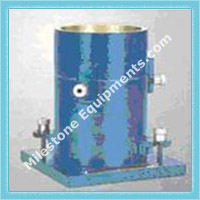MI.SO-1001 Compaction Test Rammer, Manual
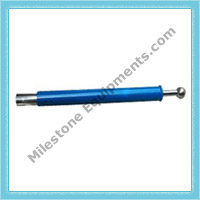 |
|
|
Compaction : Soil compaction is a
fundamental requirement for the construction of earth fill for dams,
reservoirs, canal embankments, highways, railways and runways. The
relationship between soil moisture content and compacted dry density is very
useful for deciding construction specifications and quality control of
compacted earth fill. While designing an earth or earth retaining structure,
the strength and deformation behaviour of soil is evaluated by testing soil
specimen compacted to the density as would be achieved during construction.
The construction quality control is essentially to check the density of
compacted soil achieved in the field, thereby checking its strength.
Meets: - IS: 2720 (Part 7)-1987, IS: 2720 (Part 8)-1990, IS: 9198- 1979,
IS: 10074-1982, BS: 1377
We offer two types of modals as follows .
- Compaction Test Apparatus Having 2.86 Kg Rammer X 300 MM
Fall (Light Compaction Test)
- Compaction Test Apparatus Having 4.89 Kg Rammer X 450 MM
Fall (Heavy Compaction Test.)
MI.SO-1002Compaction Test Moulds
- Compaction Mould, Dia. 4" Made of Gun metal
- Compaction Mould, Dia. 4" Made of M. Steel
- Modified Compaction Mould, Dia. 6" Made of Gun metal
- Modified Compaction Mould, Dia. 6" Made of M. Steel
MI.SO-1003D Universal Automatic Compactor,
Digital
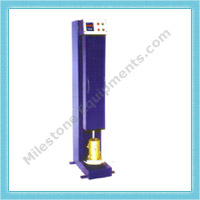 |
Universal Automatic Compacter
|
It is a motor driven mechanical compactor useful
for soil compaction. Two sets of Rammers are provided The rammer assembly is
provided with a ratchet and pawl arrangement to lift it from the top of the
soil layer. When the rammer reaches the required height the pawl release the
rammer which falls freely on soil surface. An automatic blow counter fitted
to the compactor is used to set the number of blows. The base plate of the
specimen mould is to be fitted to the rotating base plate of the instrument
which marks 1/5" revolution per stroke. The equipment is suitable for
operation on 230 V, 50 Cycles, Single Phase, A.C. supply
Meets:- ASTM D 558, BS 1377-4
Note: - Only one mould is provided with the machines.
Consolidation
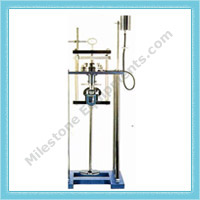 |
Consolidation single cell
|
This test is for conducting one dimensional
consolidation test using either fixed or the floating ring for determining
The consolidation characteristics of soil
Meets: - IS: 2720 (Part 15) 1986, IS: 12287-1988, BS: 1377, ASTM D2435
MI.SO-1004 Consolidation Apparatus
The standard outfit comprises fixed ring type of
consolidometer cell for testing specimens 60 mm dia x 20 mm thick, but the
unit is so designed that specimens of varying sizes from 50 mm dia to 100 mm
dia can also be tested. Besides, the same loading unit can be used with
floating ring consolidometer cells, which can be supplied at extra cost. The
standard outfit is supplied with a set of weights to give a total pressure
of 10 kg/cm2 (besides a seating load of 0.05 kg/cm3 on the specimen), but an
additional set of weights are required to reach the full capacity of 20
kg/cm2. The necessary accessories to perform the permeability test of the
'Varying Head' type can also be provided at extra cost. The outfit is also
available as three-gang or six-gang in which three/six consolidometers are
mounted on a single frame. The consolidation may be measured by the
conventional dial gauges or using the transducers and electronic readout
unit in Digital Modals.
MILESTONE INSTRUMENTS offers the following models:
- Consolidation Apparatus 60mm specimen dia, single gang
- Consolidation Apparatus 60mm specimen dia, three gang
- Consolidation cell assembly
MI.SO-1005 Direct Shear
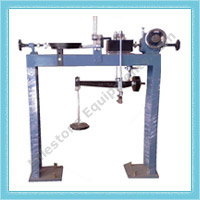 |
Direct Shear Apparatus Manual
|
|
|
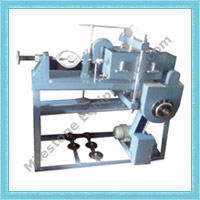 |
Direct Shear Apparatus 50 KN
|
Used to determine the resistance to shearing of all
types of soil specimens both consolidated and drained, undisturbed or
remolded samples.
Meets:- IS: 2720 (Part 13), ASTM D 3080, IS: 2720 (Section 1 - Part
39),IS: 11593-1986, IS: 11229 - 1985, 2720 (Part 13) - 1986
MILESTONE INSTRUMENTS offers the following models:
- Direct Shear apparatus, 2 KN Manual
Specimen Size: 60 x 60 x 25 mm
- Direct Shear apparatus, 2 KN Motorised
Rates of Strain (mm/min): 1.25,
Specimen Size: 60 x 60 x 25 mm
Power Specifications: 230 V, 50 Hz, Single Phase, AC supply
- Direct Shear apparatus, 2 KN, Motorised with Digital Readout
Read Out: Digital Rates of Strain (mm/min): 1.25,
Specimen Size: 60 x 60 x 25 mm
Power Specifications: 230 V, 50 Hz, Single Phase, AC supply
- Direct Shear apparatus, 2 KN,
Type of Shear Measurement: Direct/Residual Operation: By stepper motor
Rates of Strain: 0.00001 to 9.99999 mm/min
Specimen Size: 60 x 60 x 25 mm
Digital Display: Displacement and Speed with 0.00001 mm resolution
Provided RS232 for PC connection
Max vertical direct load: 3 kg/cm2
Power Specifications: 230 V, 50 Hz, Single Phase, AC supply
- Pneumatic Direct Shear apparatus, 2KN
Direct/Residual Shear Apparatus utilizes the pneumatic loading concept
for applying the vertical load to the sample. It eliminates the need of
loading weights used in dead weight-type systems.
Type of Shear Measurement: Direct/Residual Operation: By stepper motor
Vertical Load is applied by the pneumatic loading concept.
Rates of Strain: 0.00001 to 9.99999 mm/min
Specimen Size: 60 x 60 x 25 mm
Digital Display: Displacement and Speed with 0.00001 mm resolution
Provided RS232 for PC connection
Max vertical direct load: 3 kg/cm2
Power Specifications: 230 V, 50 Hz, Single Phase, AC supply
- Large Direct Shear Apparatus, Motorised, 50 KN (5,000 kgf) IS:
2720 (Section 1 - Part 39), IS: 11593-1986
For testing sands, gravel, gravely clays and clay gravels for use in
rolled fill embankments.
Type of Shear Measurement:
Direct Operation: Motorised
Rates of Strain (mm/min): 72 speeds Ranging from
0.0014 to 10.16mm/min
Specimen Size: 30 x 30 x 15 cm
Change gears: 12
Shear Load capacity: 50 kN
Vertical load capacity: 500 kN/m2
Net weight: 990 kg
Power Specifications: 220 V, 50 Hz, 1 phase, AC
supply
MI.SO-1006 Dynamic Cone Penetrometer
For determining the resistance of different soil
strata to dynamic penetration of a 50 mm cone and thereby obtain an
indication regarding their relative strengths or density or both. The method
helps survey of large area in a short time. In some cases, especially if the
depth is great, it may be difficult to pull out the cone after the
completion of the test. Hence the cone without threads should be used in the
case of deep soundings as it may be left in the ground. For shallow depths,
generally up to 15 m, if the conditions permit, the cone with threads may be
used. It consists of following:
- Cone Plain 50mm base dia and cone angle 60 deg.
- Cone adaptor with cone and standard threads for 'A' rod coupling.
- Cone threaded for 'A' rod coupling 60 deg. cone angle, 50mm base
dia.
California Bearing Ratio
The CBR test is used for determining the relative
bearing ratio and expansion characteristics under known surcharge weights of
base, sub-base and sub grade soils for the design of roads, pavements and
runways. Tests can be conducted on all types of soils including sand, gravel
and washed stone (passing through 20 mm IS Sieve). The CBR test is used
extensively in selection of materials and control of sub grades. The
procedure consists of loading soil with a circular piston, 50 mm dia face
and maintaining a penetration rate of 1.25 mm/min. The load is noted and the
results of test on natural or recompacted soils, in soaked and unsoaked
conditions, can be compared with standard test results.
Meets:- IS: 9669 - 1980 IS: 2720 (Part 16) - 1979
MI.SO-1007 Laboratory CBR Apparatus, Manual, 50
kn
Same as MI.SO-1008 but having manual operation
MI.SO-1008 Laboratory California Bearing Ratio
Test Apparatus, Motorised
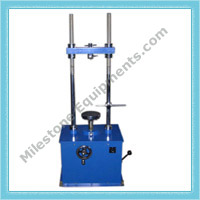 |
CBR Load Frame Three Speed
|
The apparatus consists of
- Mould, 150 mm ID x 175 mm high M. steel
- Metal Tripod, for Dial Gauge
- Penetration Piston, 50 mm face dia
- Circular Metal Spacer Disc, with detachable handle, 148 mm dia x
47.7 mm height
- Perforated Plate, 148 mm dia, with adjustable Stem and Lock Nut
- Soaking Tank for six CBR mould
- Extension Collar, 150 mm ID x 50 mm high
- Annular Metal Weight, 2.5 kg, 147 mm dia with 53 mm dia central hole
- Slotted Metal Weight, 2.5 kg, 147 mm dia, with 53 mm dia slot
- Swell Plate
- Cutting Collar
MI.SO-1009 Laboratory California Bearing Ratio
Test Apparatus, Motorised with Digital Display and Multiple speed
This motorised machine with electronic digital
control by microprocessor is suitable to perform all the tests where the
requested speed rate is within 0.1 to 60.0 mm/min. with Max. load of 50 kN
MI.SO-1010 California Bearing Ratio Test
Apparatus, Field Type
The use of the in-situ CBR apparatus on large road
construction projects has increased considerably in recent years. This
apparatus, mounted on a rolled steel joist cantilevered from the back of the
truck or fitted to the underside of a mobile frame, can be used to determine
the bearing capacity of soils quickly and efficiently. This method of
testing in-situ, using piston penetration, is useful for determining the
load carrying capacity in the field, when the in-place density and water
contents are such that the degree of saturation is 80 % or greater, when the
material is coarse grained and cohesion less so that it is not affected by
changes in the water content and when the material has been in place.
Meets:-IS: 2720 (Part 31)
Optional Extra
- Dial Gauge: 0.01x25 mm
- Proving Ring: 50 kN (5,000kgf) capacity
MI.SO-1011 Cone Penetrometer Method
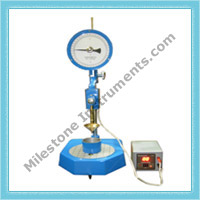 |
Automatic Cone Penetrometer
|
Meets:- IS: 2720 (Part 5) - 1985, IS: 11196 -
1985,
Available in two options as follows
- Cone Penetrometer, Automatic
The unit is supplied complete with a stainless steel penetration test
cone 35 mm long with a smooth polished surface and an angle of 30°.
Facility exists for adjusting cone height in relation to the specimen.
Cone Penetrometer consists of one each of the following: Automatic Timer
Penetration Test Cone Penetration Test Cup, 55 mm dia x 40 mm deep
- Cone Penetrometer
Cone Penetrometer consists of one each of the following:
Penetration Test Cone, Penetration Test Cup- 55 mm dia x 40 mm deep
MI.SO-1012 Liquid Limit Apparatus
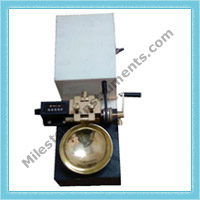 |
Liquid Limit Electrical operated
|
|
|
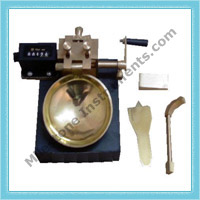 |
|
Liquid Limit, Hand Operated
|
The liquid limit, defined as the moisture content
at which the soil passes from the plastic state to the liquid state, is very
helpful in the classification of the potential properties of the soil
material. The liquid limit gives a measure of the shearing resistance which
a soil has when mixed with water. Casagrande Method or Cone Penetrometer
Method can determine the liquid limit of soil.
Meets: - BS: 1377, ASTM: 89, IS: 2720 (Part 5), IS: 9259
MILESTONE INSTRUMENTS offers the following models
- Liquid Limit Device complete with Casagrande's grooving tool and
gauge block
The Liquid Limit Device consists of a hard rubber base carrying a
sliding carriage assembly to which a brass cup is hinged. The cup is
raised and allowed to fall through a height of 1 cm on to the hard
rubber base, by the help of a lead screw provided at the back of the
sliding carriage. Supplied complete with Casagrande Grooving Tool and
Gauge Block
- Liquid Limit Device complete with Casagrande's grooving tool,
gauge block and Counter
- Liquid Limit Device, Motorised, complete with Casagrande's
grooving tool, gauge block and Counter
The Liquid Limit Device consists of a hard rubber base carrying a
sliding carriage assembly to which a brass cup is hinged. The cup is
raised and allowed to fall through a height of 1 cm on to the hard
rubber base, by the help of of electric motor which operates on 220
Volts 50 Hz. and also lead screw provided at the back of the sliding
carriage Supplied complete with Casagrande Grooving Tool and Gauge Block




